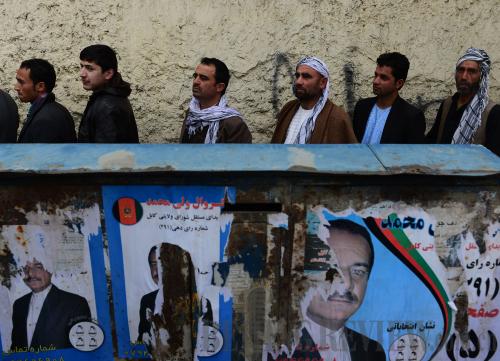|
 |
|
ESSENTIAL ELECTION: Voters queue to cast their ballots in the presidential election at a polling station in Kabul on April 5 (AFP) |
Afghanistan stands at a historical crossroads. Although the outcome of its third presidential election is still up in the air, it's only a matter of time until the landlocked and rugged country will see off President Hamid Karzai who has been in power since 2001 and will step down after a new government takes office. Meanwhile, combat troops led by the North Atlantic Treaty Organization (NATO) are due to finish their withdrawal before the end of this year, leaving the Islamic republic and her people to determine their own destiny.
Afghanistan's future is highly important for the security and stability of the region. During his visit to Kabul in February, Chinese Foreign Minister Wang Yi said the international community—including neighboring China—hopes to see a united, stable, prosperous and friendly Afghanistan. To achieve this objective, China and other states will continue to offer aid, Wang added.
But Afghanistan has been torn by decades of conflict, terrorism and poverty. Hua Liming, a senior researcher with the Beijing-based China Institute of International Studies, said that Afghanistan's future depends on whether it can tackle the three major challenges spanning political, security and economic fronts.
Triple challenges
Afghanistan's first challenge is to undergo a power transition. The process, however, has not gone as smoothly as many hoped. Voting for the third presidential election since the Taliban's fall in 2001 was held as early as on April 5. Neither of the two candidates—former Foreign Minister Abdullah Abdullah and former Finance Minister Mohammad Ashraf Ghani Ahmadzai—surpassed the winning threshold by receiving over half of the total votes, but Abdullah secured the lead.
The presidential run-off election took place on June 14 in line with the election law, with a preliminary count showing that Ghani took 1 million votes more than his rival Abdullah. But Abdullah refused to acknowledge the outcome and made claims of electoral rigging. At the request of the Independent Election Commission of Afghanistan and the two candidates, the run-off election results were audited under UN oversight. Due to the complicated audit work and disputes between the two candidates, the Independent Election Commission has repeatedly postponed announcing the result. Fears have grown that Afghanistan's political system will suffer if the election is not resolved promptly.
Security is another uncertainty. In most areas of Afghanistan, the NATO-led International Security Assistance Force (ISAF) undertook security duties in the past decade since the fall of the Taliban regime at the end of 2001. Moreover, U.S. and other NATO combat troops played a crucial role in major battles against the Taliban. Another important task of the ISAF was to train Afghan military forces.
After U.S. President Barack Obama announced the withdrawal of troops from Afghanistan in 2009, ISAF has been handing over security duties to Afghan troops. In his final address to the parliament in March, President Karzai said that Afghan security forces had protected 93 percent of the country and were prepared to take over entirely.
But it is still uncertain whether Afghanistan's fledging security forces are capable of preventing the resurgence of extremist militants who hide in remote mountainous areas near the border between Afghanistan and Pakistan.
Though the security situation in Afghanistan was notably stable during the presidential election, the Taliban is reportedly preparing for a comeback after foreign combat troops leave the country.
| 